Entrevista a la embajadora de Marruecos en Colombia y Ecuador
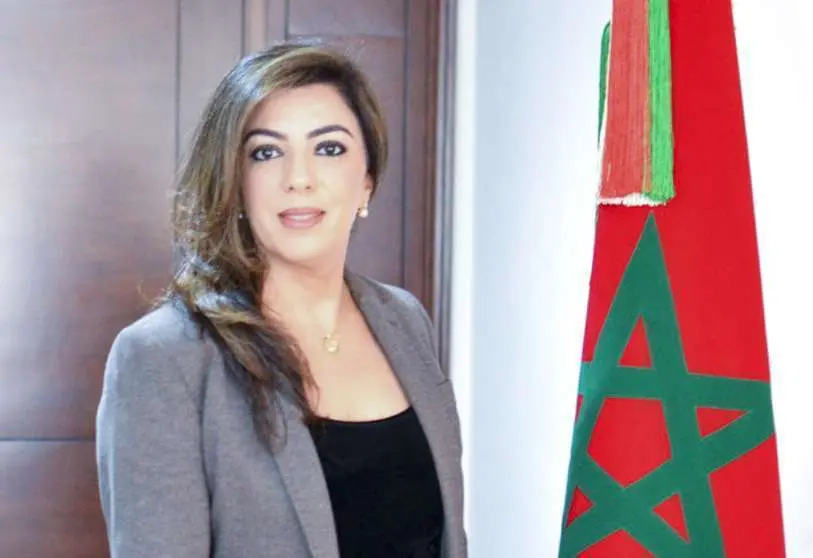
The reality of transatlantic cooperation and diplomacy in the South-South paradigm is not common to everyone. This is called south-south cooperation, a "political and economic term referring to the long-term goal of achieving global economic changes that are mutually beneficial to the countries of the global south and lead to greater solidarity among developing countries in the world system".
World diplomacy has also been raised to these levels of cooperation with the hope that the countries of the global south "will assist each other in social, political and economic development, radically altering the world system to reflect their interests and not just the interests of the global north in the process".
Countries using this model of south-south cooperation, such as Morocco, which has decided to spread its diplomatic wings to Latin American countries, believe it is a "mutually beneficial relationship that spreads knowledge to be shared with positive ends for all participating countries".
With this new concept of international relations, new synergies have been created, in this case led by the Moroccan side in Bogota by Mrs Farida Loudaya, Ambassador of Morocco to Colombia.
For many, it is new to see a Moroccan woman so far from her country as an ambassador; however, this shows a strong development in women's access to countless positions and professional careers, where power is not contested by the gender of the person who deserves it.
It is an important glimpse of hope to meet women who have been able to empower themselves in careers such as diplomacy, since it is not only an invitation to the development of emancipation and education in women's power, but a silent social revolution that draws a line for the insertion of women in sectors where they have been long excluded all over the world, mostly because being a "woman" was an impediment to believing in their full qualification as professionals.
Being a woman in the field of Moroccan diplomacy is now a possibility to be considered by many Moroccan women whose ambition is international relations and the foreign sphere, as several women are now referents in this sense.
For this reason, I believe that women such as Mrs Farida Loudaya and other fellow representatives of the Kingdom of Morocco deserve a voice, as they are pioneers on the path that others want to take, likewise it is essential to stress the South-South work, far from the typical Eurocentrism in which women from Muslim countries are usually exemplified.
South-south dialogue is essential for the union of countries in full growth and development such as Morocco-Colombia/Ecuador, and it develops a genuine dialogue to discuss issues to be implemented, both at home and abroad, and can serve as a shield and example to learn from each other about similar social circumstances.
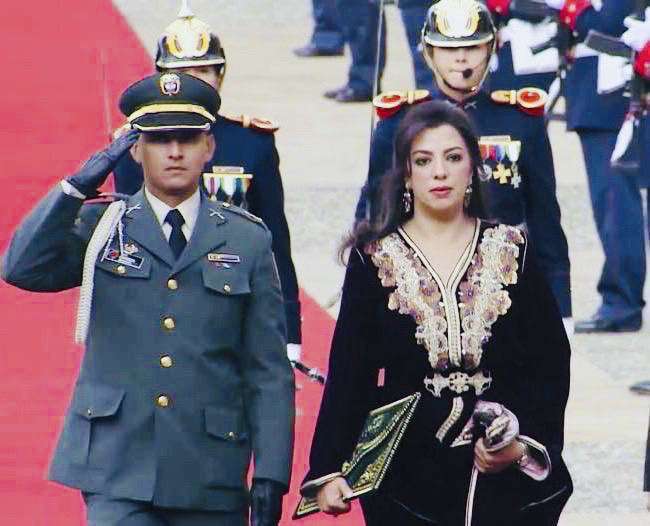
We are not used to seeing women ambassadors from Muslim countries. What does this role in Moroccan diplomacy mean to you?
Thanks to the High Instructions of His Majesty King Mohammed VI, who has always been and continues to be the main defender of women's rights in Morocco, Moroccan women have gradually been playing an increasingly important role in the political life and socio-economic development of my country.
Today, as you well know, this process of empowering women has led them to become more involved in fields as diverse as politics, business, research, science, among others, making them Morocco's best ambassadors in many different sectors.
As far as Moroccan diplomacy is concerned, it is worth highlighting that the participation of women in this field has made great progress, which has resulted in the appointment of 17 female ambassadors to the African continent, the American continent and Europe.
What was it that most empowered you to carry out this work?
Diplomacy has always been exciting, challenging and demanding, and I consider it an honour, a source of pride and a great responsibility to represent my country in many different scenarios.
What would you recommend to those Moroccan women who want to engage in diplomacy?
I would tell them, among other things, to believe in themselves and their abilities and to fight for their goals.
However, I have always wondered why, when it comes to a woman in high office, there is a tendency to question how, while in a man it is taken for granted. That is why I definitely believe that the day when gender is not relevant to occupying positions of responsibility, that day we will achieve true equality, without discrimination between women and men and, above all, by valuing the real capabilities of each and the merits of occupying such positions.
Before coming to this position, you were Director of the Americas at the Moroccan Ministry of Foreign Affairs and Cooperation, as well as in other diplomatic missions of the Kingdom.
In fact, my professional career has allowed me to occupy several positions of responsibility, both internally in the Chancellery of my country, and abroad, thus helping me to climb, one by one, all the steps.
Since 1995, when I started my diplomatic career, I have held many positions of responsibility for European countries, including in the Directorate of European Affairs in the Ministry, where I was responsible for Morocco's relations with the European Union and for the service of European regional organisations.
Subsequently, I had the opportunity to serve in our diplomatic missions in major European capitals: from 2000 to 2003 I was Counsellor in charge of Economic Affairs at the Moroccan Embassy in the Netherlands, and between 2004 and 2008 I was Head of the Political Department at the Moroccan Embassy in Paris.
In 2004, the tour undertaken by His Majesty King Mohammed VI to several Latin American countries gave fresh impetus to diplomatic relations and cooperation links with several countries in the region. It was within this context that upon my return from France, and after having spent a year as head of the Southern and Eastern European Service, my career was oriented towards the American continent, first as head of the Latin America Division, from 2009 to 2011, before being promoted to director of the Americas, which includes the United States, Canada, South America and the Caribbean, a position I held from 2011 until October 2016, when I had the great honour of being appointed by His Majesty King Mohammed VI as ambassador to Colombia and Ecuador. This orientation has allowed me to learn in depth about the challenges of this important region, as I visited most of its countries, with which we have many affinities and share immense challenges.
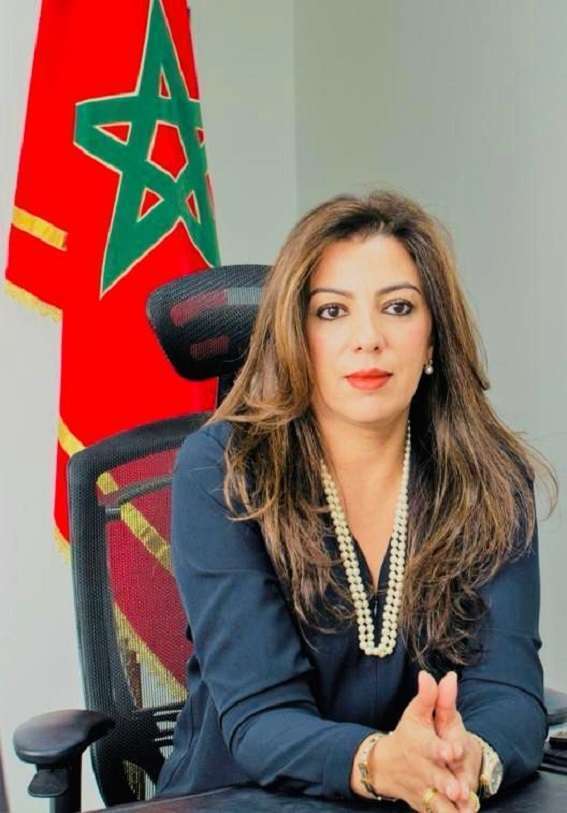
There is sometimes too much focus on foreign relations in Europe, but what do you think is the contribution that Colombia and Ecuador, and their relations with Morocco, make to both countries?
I think that our relations with Europe are certainly important, but not exclusive, as Morocco has always had very close ties with almost all the countries of the world, ranging from Africa, the Arab world, Asia and the entire American continent, from the United States and Canada to Tierra del Fuego in Argentina.
Our relations have diversified and expanded, in accordance with the high instructions of His Majesty King Mohammed VI, who, as you know, defines Morocco's foreign policy.
As for relations between Morocco and Colombia, it should be noted that a great deal of maturity has been achieved, through a fluid political dialogue, with improved economic and commercial exchange, as well as cultural and academic exchange. We share the same values of democracy, freedom and respect for human rights and we continue to work to strengthen our cooperation in other sectors, both bilaterally and multilaterally and particularly in the framework of South-South cooperation.
There is also a positive dynamic between Rabat and Bogota towards a great multifaceted alliance.
Both countries, each in its own region, face similar global challenges such as global security, migration, human development, food security, climate change, among others, and share the same perspective, that facing these challenges requires the concerted efforts of States and international organisations to overcome them collectively.
Similarly, we have strengthened the constructive dialogue with Ecuador for the consolidation of our bilateral relations, deepened by the historic visit in 2019 of a high-level Ecuadorian delegation to Morocco, during which the mutual willingness to strengthen economic, commercial, cultural and tourist ties, among others, was expressed.
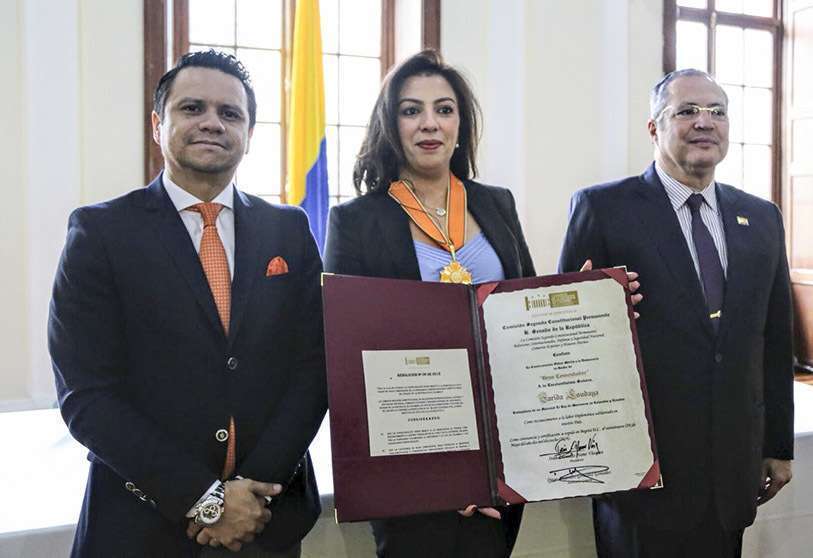
What would you highlight about your work in Latin America on behalf of the Kingdom of Morocco?
As you know, I have been Ambassador to Colombia and Ecuador for more than four years and I am pleased to say that, during this time, our relations have developed very positively.
In this respect, the bilateral relationship with Colombia is of the utmost importance, as it is first and foremost a state relationship. His Majesty King Mohammed VI and His Excellency President Iván Duque Márquez hold each other in high esteem and consideration. There is a strong friendship between our two countries, characterised by mutual trust, strengthened by a constant and long-standing political dialogue and a convergence of views on many issues of common interest.
Within this framework, several official visits and meetings between ministers and senior officials of the two countries have taken place, both bilaterally and in the margins of international fora, demonstrating the strength and strategic nature of this relationship.
Similarly, our political dialogue, which is very important, has been undeniably strengthened in recent years. Within this framework, the important meeting between my foreign minister, Mr Nasser Bourita, and the Colombian ex-foreign minister, Mr Carlos Holmes Trujillo, during his visit to Morocco in June 2019-the one and only bilateral visit he made to an African country-gave a major boost to our cooperation with Colombia. It should be recalled that during this visit the Colombian government's position on the Moroccan Sahara was reiterated.
In this respect, the former foreign minister ratified "his full support for the efforts of the UN Secretary General to achieve a fair, lasting and mutually accepted solution, welcoming the autonomy proposal presented by Morocco in 2007, with a view to reaching a political, realistic and lasting solution based on the commitment of all the parties to put an end to this regional dispute which is fundamental for Morocco in terms of sovereignty and territorial integrity". In fact, this support was reiterated on 20 November 2020, through the publication of a communiqué from the Colombian Foreign Ministry, supporting Morocco, its sovereignty and its security.
It should be recalled that seven months after this important visit, Deputy Minister of Multilateral Affairs Adriana Mejía co-chaired in Rabat, in February 2020, the work of the second session of the Morocco-Colombia Joint Commission, which made it possible to consolidate this positive dynamic, with the adoption of an ambitious cooperation programme for the next two years, in which new sectors of common interest, such as agriculture, tourism, crafts, security, culture and sport, reinforce the important range of our strategic partnership.
On the other hand, parliamentary cooperation has also been consolidated with the expansion of the Inter-Parliamentary Friendship Group in the Colombian House of Representatives, as well as the signing, in 2019, of a Memorandum of Understanding between the Houses of Representatives of our two countries. Similarly, it is important to note that in 2018 the first Colombian-Moroccan friendship group was created within the Colombian Senate. Likewise, over the past three years the Colombian Congress has reiterated its support for Morocco on the issue of the Moroccan Sahara on several occasions, through the adoption of four historic resolutions in 2017 and 2018, in which the majority of Colombian parliamentarians of various political tendencies, clearly expressed their full support for respect for and preservation of the sovereignty and territorial integrity of the Kingdom of Morocco, and unanimously welcomed the efforts made by our country to put an end to the artificial conflict over the Moroccan Sahara, thus considering the Moroccan initiative for the negotiation of a Statute of Autonomy for the Sahara region as the ideal political solution for putting an end to this regional dispute.
Furthermore, our cultural and academic cooperation has also developed significantly, through the signing of several agreements between Moroccan and Colombian universities, as well as Morocco's participation in important regional and international events and fairs organised in Colombia.
In short, in recent years we have carried out a large number of actions which have undoubtedly given new impetus to our bilateral cooperation. However, one of the aspects we must work on most is that of economic exchanges which are waiting for further development. To this end, it is important to diversify and expand the products that can be exchanged, as well as to take advantage of the strengths of each of the countries to share successful experiences through partnerships between sectors and the exchange of visits by businessmen in order to acquire greater knowledge of the markets, thus allowing for greater opportunities for investment, trade and exchanges, among others.
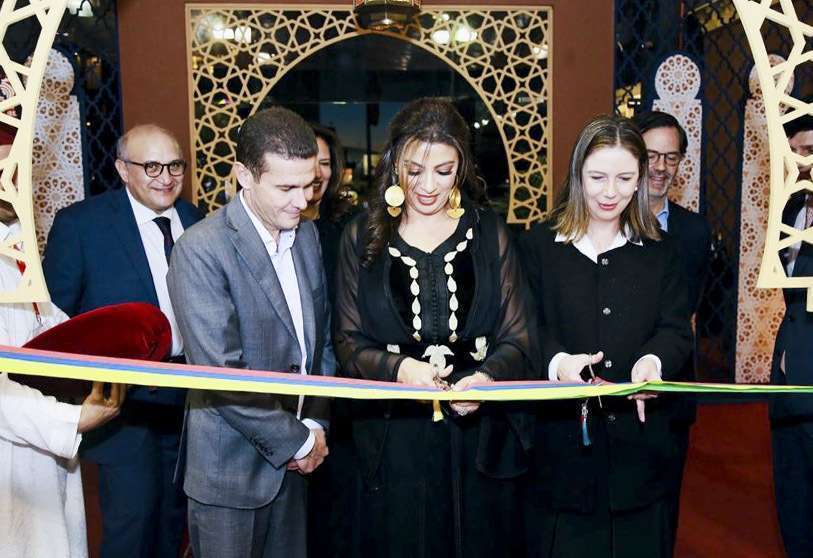
What aspects would you consider important to implement in order to improve the relationship on both sides of the Atlantic?
The geographical perimeter of the Atlantic has always been extremely important and strategic for Morocco's foreign policy. Along with Euro-Mediterranean relations, I believe that transatlantic-southern cooperation also deserves to be further developed. There is a real potential for cooperation within this area that should be exploited and Morocco, which over the years has become an indispensable player and an important partner on the African continent, has all the qualities to contribute to the development of this cooperation with Latin American countries.
This strengthening could be achieved through two important aspects; first, continuing to reinforce political cooperation and trade exchanges, as it is of the utmost importance to diversify trade partners in this area; and second, through academic and cultural exchanges.
Today, Morocco represents the gateway to Africa for Latin America and has many advantages that may encourage the countries of the region to take an even greater interest in trade between our two regions, such as geographical position, political stability, infrastructure and logistics. Morocco has become, over the last two decades, a port and airport hub in the region thanks to its port platforms and free zones that meet international standards as well as its connectivity. It should also be noted that Morocco enjoys a very broad and diverse industrial fabric with sectors with a strong added value such as the automobile industry; aeronautics; off-shoring; and textiles, among others.
Moreover, in recent years Morocco has been a preferred partner for many countries and in areas such as renewable energies, and precisely in view of climate change and its effects, we are ready to share this experience with many friendly countries in Latin America.
On the cultural and academic side, we need to combine our efforts and multiply the meetings, which for me are fundamental in strengthening these relations. The more we get to know each other the more we will advance in promoting cultural, university and scientific exchanges to reaffirm the rapprochement, communication and unity of the peoples.
We must not forget that Morocco shares very strong cultural and historical ties with the countries of the region, as it has more than six million Spanish speakers, which distinguishes it from other African and Arab countries and I am therefore sure that it is best placed to play this role of liaison between the two continents, while at the same time it could accentuate the uniqueness of its relations with Latin America at all levels.

How was it living the pandemic in Colombia with all the complications that COVID-19 implies for the correct development of the activities that you coordinated from the Embassy?
Well, more than eight months after the outbreak of this totally unexpected pandemic, the whole world has had to adapt to what we call the "new normal". At the Embassy we have kept up the same pace, complying with our daily activities, abiding by the biosecurity protocols decreed by the Colombian Government, implementing teleworking and reducing the number of staff in attendance at our diplomatic mission facilities to a minimum. Likewise, we have taken full advantage of the virtual world to continue developing our work agenda.
In Colombia, since the beginning of September, the government decreed a selective isolation, opening up practically all the productive sectors to strengthen the economy, which has been extremely affected by this pandemic, leaving it up to the citizens to take care of themselves and to respect the biosecurity measures to contain and mitigate the pandemic. Although there are many daily cases of new infections in the country, the percentage of recoveries is over 90 percent, which is a very positive development in this respect.
At this time, and after what is happening in Europe, the region is preparing to face a possible resurgence of the disease by remaining vigilant to biosecurity measures to minimise the risks of contagion, but at the same time trying to resume, in the best possible way, everyday activities. Unfortunately, the reality is that COVID-19 is still present and we must learn to live with it.
How do you think Morocco has acted in the face of such a dramatic situation worldwide?
To face this health crisis, Morocco was one of the first countries to react, thus anticipating many of its neighbours. From the beginning of the COVID-19 pandemic, my country took drastic measures to try to contain the spread of the virus.
The strategy implemented in response to this situation was based on five principles, defined by His Majesty King Mohammed VI, namely solidarity; anticipation; prevention; a holistic approach and the prioritisation of citizens, especially the most vulnerable.
During this particularly difficult period, our sovereign has given priority to the health and safety of Moroccans, first and foremost by giving his high instructions to all sectors to accompany the population particularly in a delicate and precarious situation, supporting the economy and guaranteeing the supply of food and pharmaceutical products.
Morocco has demonstrated its world-recognised ability to manage the crisis by speeding up and rapidly adapting the industrial sector, which has enabled it to produce medical and health equipment that meets international standards, such as mask covers, hydro-alcoholic gels, high-tech respirators, specialised beds for ICUs, decontamination tunnels, etc., often at prices up to four times lower than those of imports. The country has also been making continuous efforts to improve its health system and to mitigate the socio-economic impact of the crisis.
At the same time, the King gave his high instructions to create the "Special Fund for the Management of the COVID-19 Coronavirus Pandemic", initially resourced and supplemented by public and private sector contributions to sustain the national economy, through a series of measures to support vulnerable sectors and protect and generate employment, with a view to mitigating the social impact of this crisis.
Recently, HM King Mohammed VI gave his high guidance to carry out a massive vaccination campaign against COVID-19 in the coming weeks, among other measures undertaken to curb the spread of the pandemic in the country.
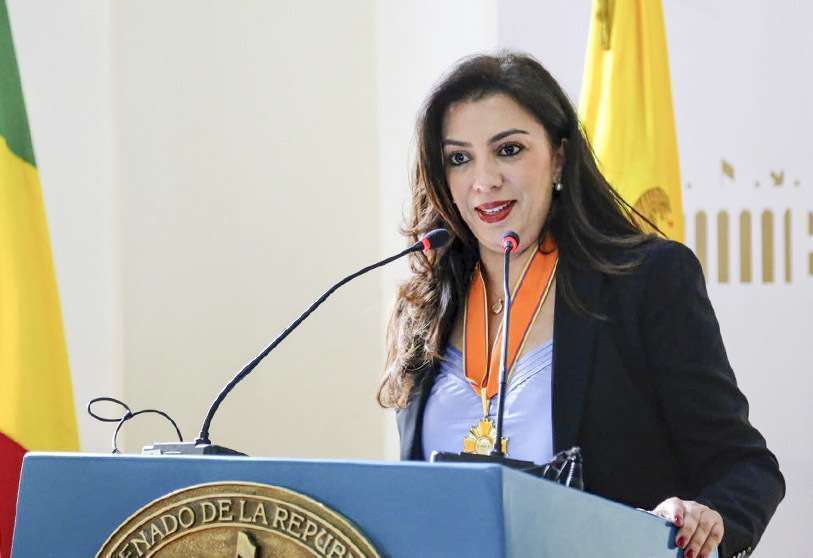
Is there currently a protocol for Embassies and external missions to which your Embassy has been subjected?
Regarding your question about the protocols that exist for Embassies and diplomatic missions, since we all basically abide by the guidelines of the Colombian Government regarding the restrictions that exist for holding receptions or face-to-face meetings, managing our agendas basically in the virtual environment and following the recommendations of specialists in the field.
Do you think that being Ambassador to a country of the Global South coming from another country of the same area makes your task and the twinning of both countries more attractive?
With Colombia we share a common denominator in favour of strengthening South-South cooperation, which is a priority for the foreign policy of both countries, in order to promote the generation of positive agendas. This cooperation allows us to exchange knowledge and experiences that are enriching for both countries within a "win-win" approach that benefits our peoples. We are two countries with a high potential, which offer all the conditions for a sustainable and complementary cooperation and we are committed to strengthening our ties of cooperation and friendship with the countries of the region, with a view to raising them to the level of a multidimensional and increasingly ambitious partnership.
Morocco is a country that makes you dream, not only because of its spectacular landscapes, its culture, its gastronomy, its people, its mix of tradition and modernity, its tolerance and openness, but above all because of the real dynamic of development to which it has committed itself under the reign of His Majesty King Mohammed VI, and through the implementation of important political initiatives and profound economic and social reforms.
It should also be stressed that Morocco and Colombia share many similarities and cultural affinities and furthermore have several issues and priorities in common.
In my opinion, Morocco, which represents one of the African and Arab countries with the greatest presence in this region of the world, has managed to consolidate a recognised and active presence, both bilaterally and at multilateral and regional level.
In short, Colombia and Ecuador are countries that I carry in my heart because of their enterprising, fighting, cheerful and optimistic people, because of their immense diversity and infinite wealth and, above all, because of that welcoming spirit that always makes me feel that I am in my own land.









